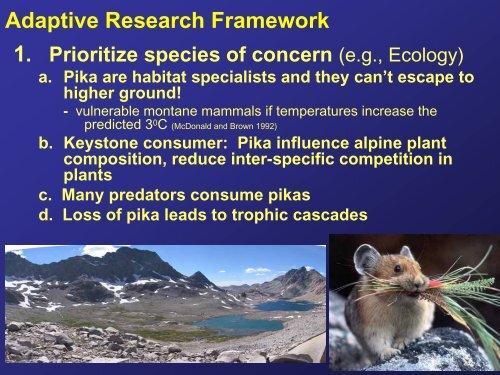climate change effects on predator/prey interactions: how can we ...
climate change effects on predator/prey interactions: how can we ... climate change effects on predator/prey interactions: how can we ...
Adaptive Research Framework 1. Prioritize species of concern (e.g., Ecology) a. Pika are habitat specialists and they can’t escape to higher ground! - vulnerable montane mammals if temperatures increase the predicted 3 0 C (McDonald and Brown 1992) b. Keystone consumer: Pika influence alpine plant composition, reduce inter-specific competition in plants c. Many predators consume pikas d. Loss of pika leads to trophic cascades
Adaptive Research Framework 2. Prioritize mechanisms of
- Page 1 and 2: CLIMATE CHANGE EFFECTS ON PREDATOR/
- Page 3 and 4: Mean monthly minimum temperature: Y
- Page 5 and 6: Animals adapt on a species level Su
- Page 7 and 8: Idiosyncrasy in our thinking and ou
- Page 9 and 10: Prey population cyclicity Cyclicity
- Page 11 and 12: Prey abundance and owl reproductive
- Page 13 and 14: Spotted Owl Diets: Yosemite Woodrat
- Page 15 and 16: How does idiosyncratic prey respons
- Page 17: ADAPTIVE RESEARCH WORK TOGETHER •
- Page 21 and 22: Salient points GIVE ANIMALS ROOM TO
Adaptive Research Framework<br />
1. Prioritize species of c<strong>on</strong>cern (e.g., Ecology)<br />
a. Pika are habitat specialists and they <strong>can</strong>’t escape to<br />
higher ground!<br />
- vulnerable m<strong>on</strong>tane mammals if temperatures increase the<br />
predicted 3 0 C (McD<strong>on</strong>ald and Brown 1992)<br />
b. Keyst<strong>on</strong>e c<strong>on</strong>sumer: Pika influence alpine plant<br />
compositi<strong>on</strong>, reduce inter-specific competiti<strong>on</strong> in<br />
plants<br />
c. Many <strong>predator</strong>s c<strong>on</strong>sume pikas<br />
d. Loss of pika leads to trophic cascades



